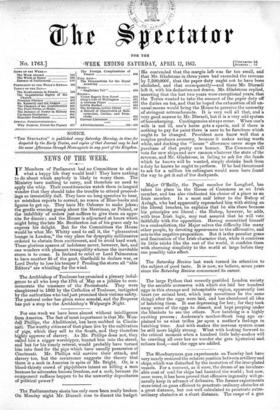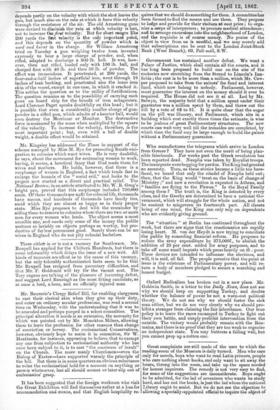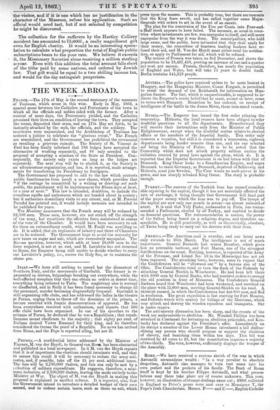NEWS OF THE WEEK.
IF Members of Parliament had no Committees to sit on what a happy life they would lead ! They have nothing to do about which anybody is likely to worry them. The Ministry have nothing to carry, and therefore no need to apply the whip. Their constituencies watch them in languid wonder that they should take the trouble to attend proceed- ings so irresistibly dull. They have no long speeches to hear, no mistaken reports to correct, no reams of Blue-books and figures to get up. They have Mr. Osborne to make jokes ; the gentle evening gossip about the Merrimac, or Poland, or the indelibity of orders just suffices to give them an appe- tite for dinner ; and the House is adjourned at hours which might bring the late Mr. Brotherton out of his grave only to express his delight. But for the Committees the House would be what Mr. Whitty used to call it, the "pleasantest lounge in London," the very place for dyspeptic millionaires ordered to abstain from excitement, and to avoid hard work. These glorious spasms of indolence never, however, last, and one wonders with pleasant tranquillity whence the inevitable storm is to come. Is Ireland to rebel or Lord Palmerston to have another fit of the gout, Garibaldi to declare war, or Lord Derby to lose his temper ? Pending the storm all "able Editors" are whistling for the wind.
The Archbishop of Toulouse has promised a plenary indul- gence to all who keep the 17th of May as a jubilee to com- memorate the massacre of the Protestants. They were slaughtered in 1562 by the Catholics of Toulouse, instigated by the authorities who had just promised their victims safety. The pastoral order has given some scandal, and the Emperor has put' a stop to the Archbishop's Walpurgis Night.
For one week we have been almost without intelligence from America. The fact of most importance is that Mr. Wen- dell Phillips, the Abolitionist, has been mobbed in Cincin- nati. The worthy citizens of that place live by the cultivation of pigs, which they sell to the South, and they therefore hi My approve of slavery. As Mr. Phillips does not, they ed him a nigger worshipper, hunted him into the street, an but for his timely retreat, would probably have turned him into food for the pigs which have usually possession of Cincinnati. Mr. Phillips will survive their attack, and slavery too, but the occurrence suggests the theory that there is a mob in America in spite of Mr. Bright. Or, is a blood-thirsty crowd of pig-jobbers intent on killing a man because he advocates human freedom, not a mob, because its coraponent ruffians happen to be the unworthy depositaries of political power ?
The Parliamentary siesta has only once been really broken. On Monday night Mr. Disraeli rose to dissect the budget. He contended that the margin left was far too small, and that Mr. Gladstone in three years had exceeded the revenue by 7,500,0001., that the paper duty ought not to have been abolished, and that consequently—and there Mr. Disraeli left it, with his deduction not drawn. Mr. Gladstone replied, asserting that the last two years were exceptional years, that the Tories wanted to take the amount of the paper duty off the duties on tea, and that he hoped the exhaustion of all un- usual means would bring the House to perceive the necessity of stringent retrenchments. It is very well all that, and a very good answer to Mr. Disraeli, but it is a very odd system of housekeeping. Contingencies always recur. When one's wife is not ill, one's horse gets a spavin, and if there is nothing to pay for paint there is sure to be furniture which ought to be changed. Provident men know well that a surplus produces economy, because it makes saving worth while, and docking the " house " allowance never stops the purchase of that pretty new bonnet. The Commons will vote for new ships and new cannon whatever the state of the revenue, and Mr. Gladstone, in failing to ask for the funds which he knows will be wanted, simply shrinks back from a duty he knows he ought to perform. If he had threatened to ask for a million his colleagues would soon have found the way to get it out of the dockyards.
Major O'Reilly, the Papal member for Longford, has taken his place in the House of Commons as an Irish member, and has also vindicated his choice of a place as an Irish member. In a most naïf letter to the Bishop of Ardagh, who had apparently reproached him with sitting on the liberal benches, he explains that he sits there because his principles are liberal : the Bishop, however, he adds, with true .Irish logic, may rest assured that he will vote faithfully with the opposition. Having committed himself to a contradiction, the Major solves the difficulty like many other people, by devoting appearances to the affirmative, and acts to the negative proposition. But it is the peculiar grace and fascination of the Irish character that, while it contrives its little tricks like the rest of the world, it confides them with charming simplicity to the world at large before they can possibly take effect.
The Saturday Review last week turned its attention to the subject of good taste. It is now, we believe, seven years since the Saturday Review commenced its career.
The large Python that recently gratified London society by the amiable unreserve with which she laid her hundred eggs in this strange and inhospitable region, apparently lost heart (or animal heat, which may sometimes be the same thing) after the eggs were laid, and has abandoned all idea of hatching them. It was depressing for her ; for they took away some of the eggs to dissect, and kept peeping under the blankets to see the others. Now hatching is a highly exciting process ; Andersen's mother-Stork long ago ex- plained to us what trifles jar upon a mother's feelings in hatching time. And with snakes the nervous system must be still more highly strung. What with looking forward to critical moment when a hundred little baby-snakes will be crawling all over her no wonder she gets hysterical and. refuses food,—and the eggs are addled.
The Shoeburyness gun experiments on Tuesday last have very nearly restored the relative position betireen artillery and ships, which was disturbed by the invention of the iron-plated vessels. For a moment, as it were, the dream of an invulner- able coat of mail for ships had haunted the world ; but now, once more, it has been proved that offensive ingenuity will ge- nerally keep in advance of defensive. The former experiments were tried on guns efficient to penetrate ordinary obstacles at a great distance, but not well calculated to penetrate extra- ordinary obstacles at a short distance. The range of a gun depends partly on the velocity with which the shot leaves the gun, but much also on the rate at which it loses this velocity through the resistance of the air. The old Armstrong guns were devised to diminish the rate at which velocity is lost, not to increase the first velocity. But for short ranges like 200 yards the first velocity is the only important point, and this depends on the quantity of powder which is used and burnt in the charge. Sir William Armstrong tried on Tuesday a gun weighing twelve tons, invented expressly to bear a large charge of powder, and, when rifled, adapted to discharge a 300 lb. ball. It was, how- ever, then not rifled, loaded only with 158 lb. ball, and charged first with 40 lb. and then 50 lb. of powder. The effect was tremendous. It penetrated, at 200 yards, the four-and-a-half inches of superficial iron, went through 18 inches of teak backing, and penetrated also the inner iron skin of the vessel, except in one case, in which it cracked it. This settles the question as to the utility of fortifications. The question remains as to the possibility of carrying such guns on board ship for the benefit of iron antagonists. Lord Clarence Paget speaks doubtfully on this head ; but it is possible that even a considerably smaller charge of gun- powder in a rifled gun, which admits of a heavier ball, would soon destroy the Merrimac or Monitor. The destructive force is measured by the mass when multiplied by the square of the velocity. To increase the velocity, therefore, is the most important point ; but, even with a ball of double -weight, a double effect would be attained.
Mr. Kingsley has addressed the Times in support of the scheme managed by Miss M. Rye for promoting female emi- gration to colonies which want wives. He is very doubtful, he says, about the movement for sentencing women to work, having, it seems, a heretical fancy that God made them for wives and mothers. He holds, however, that there is a surplusage of women in England, a fact which tends fast to enlarge the bounds of the " social evil," and looks to the project now started as a direct and practical relief. The National Review, in an article attributed to Mr. W. R. Greg's • bright pen, proved that this surplusage included 750,000 souls. Of these thousands are unfit for colonial life, thousands have means, and hundreds of thousands have family ties, amid which they are almost as happy as in their proper state. Miss Rye proposes to deal with the remainder by aiding them to remove to colonies where there are two or more men for every woman who lands. The object seems a most sensible one, and needs only some of the money the public scatters so lavishly on objects perhaps as worthy, but pro- ductive of far less permanent good. Surely there can be no wives in England who do not pity colonial bachelors.
There either is or is not a vacancy for Southwark. • Mr. Roupell has applied for the Chiltern Hundreds, but there is some informality which delays the issue of a new writ. All kinds of rumours are afloat as to the cause of this vacancy, but the only tolerably authenticated facts seem to be that Mr. Roupell has resigned from pecuniary difficulties, and that Mr. F. Goldsmid will try for the vacant seat. The Tory organs are talking of the pleasure of incurring defeat, and suggest Lord Ranelagh as the most fitting candidate, as at once a lord, a hero, and an officially injured man.
Mr. Bouverie's Clergy Relief Bill, for enabling clergymen to cast their clerical skin when they give up their duty, and enter on ordinary secular professions, was read a second time on Wednesday, with the understanding that it was to be amended and perhaps purged in a select committee. The principal alteration it needs is an extension, the necessity for which was pointed out by Mr. Monckton Milnes, allowing them to leave the profession for other reasons than change of conviction or heresy. The ecclesiastical Conservatives, however, obviously hope to maim it in committee, Sir W. Heathcote, for instance, appearing to believe that to exempt any one from subjection to ecclesiastical authority who has once been subject to it, is to cast "the maximum of insult" on the Church. The more manly Churchmen—even the Bishop of Exeter—have supported warmly the principle of the bill. But there is in some quarters an obvious reluctance to relax the ecclesiastical hold for a moment on anything or person whatsoever, lest all should sooner or later slip out of ecclesiastics' grasp.
It has been suggested that the foreign workmen who visit the Great Exhibition will find themselves rather at a loss for accommodation and means, and that English hospitality re- quires that we should do something for them. A committee has been formed to find the means and use them. They propose to lodge and provide for their visitors at cost price ; to orga- nize a corps of interpreters ; to procure medical attendance ; and to arrange excursions into the neighbourhood of London, and the requisite is of course money. No praise of the object in view from us is needful, and we may merely add that subscriptions can be sent to the London Joint-Stock Bank (West Branch), 69, Pall-mall, S.W.
Government has sustained another defeat. We want a Palace of Justice, which shall contain all the courts, and it has-long been proposed to build one on the site of the rookeries now stretching from the Strand to Lincoln's Inn- fields ; the cost is to be more than a million, which Mr. Cow- per proposed to take from the suitors' fee fund and interest fund, which now belong to nobody. Parliament, however, must guarantee the interest on the money should it ever be required. The House did not see it at all. Led by Mr. Selwyn, the majority held that a million spent under their guarantee was a million spent by them, and threw out the bill by a vote of 83 to 81. It is quite clear that the sugar on the pill was illusory, and Parliament, which sits in a building which cost exactly three times the estimate, is wise to be jealous of great Parliamentary structures. The new courts can wait very well till the ironsides are completed, by which time the fund may be large enough to build the palace without a Parliamentary guarantee.
Who manufactures the telegrams which arrive in London from Greece? They have not even the merit of being plau- sible falsehoods. For weeks past the Greek revolution has been reported dead. Nauplia was taken by Royalist troops. The insurgents were begging for pardon. The King had granted an amnesty. Then, as these stories became a little too bare- faced, we heard that only the citadel of Nauplia held out; then, that the King would " treat on the basis of change of Ministry ;" and now a revolution is expected in Athens, and " families are flying to the Pirmus." Is the Royal Family among them P The truth is, the King is detested by every class, and the Greeks are determined to have a national Go- vernment, which will struggle for the whole nation, and not be content to misgovern its fourteenth part. All classes being of one mind, the King can only rely on dependents who are evidently giving ground.
The " situation " at Berlin has continued throughout the week, but there are signs that the reactionaries are rapidly losing heart. M. von der Heydt is now trying to conciliate the public by conceding financial reform. He proposes to reduce the army expenditure by 375,0001., to abolish the addition of 25 per cent. added for army purposes, and to take off some small imposts which press heavily on ft.." poor. These devices are intended to influence the elections, and will, it is said, all fail. The people perceive that the point at issue is the existence of Parliamentary power, and will re- turn a body of members pledged to secure a searching and honest budget.
Oxford Radicalism has broken out in a new place. Mr. Goldwin Smith, in a letter to the .Daily News, does not see why we should keep on supporting Turkey, and doubts whether the balance of power be not a worn-out political theory. We do not see why we should foster the sick man either, but we do see very clearly why, we should pro- hibit a stranger from claiming the fair inheritance. Our true policy is to leave the races encamped in Turkey to fight out their own battle, and simply prohibit intervention from the outside. The victory would probably remain with the Rou- mains, and there is no proof that they are too weak to organize an independent state. You may buttress a falling wall, but you cannot prop up a rotten one.
Great complaints are still made of the uses to which the reading-room of the Museum is daily turned. Men who care only for novels, boys who want to read Latin primers, people who care nothing about books, and only want to sit away the hours, throng into the room, and take up the space needed for honest inquirers. The remedy is not very easy to find, for some of the suggestions are inconsiderate. Boys ought to be admitted, for the lad of seventeen who wants to study hard, and has not the books, is just the lad whom the national Library ought to assist. But we do not see the objection to allowing a specially-appointed official to inquire the object of the visitor, and if it is one which has no justification in the character of the Museum, refuse his application. Such an official would need tact, but if not selected by competition be might be discovered.
The collection for the sufferers by the Hartley Colliery accident has amounted to 75,0001., a- really magnificent gift even for English charity. It would be an interesting specu- lation to calculate what proportion the total of English public subscriptions bears to the poor rate. We believe it exceeds it, the Missionary Societies alone receiving a million sterling a-year. Even with this addition the total amount falls short of the tithe paid by some nations, and ordered by Jewish law. That gift would be equal to a two shilling income tax, and would for the day extinguish pauperism.
































